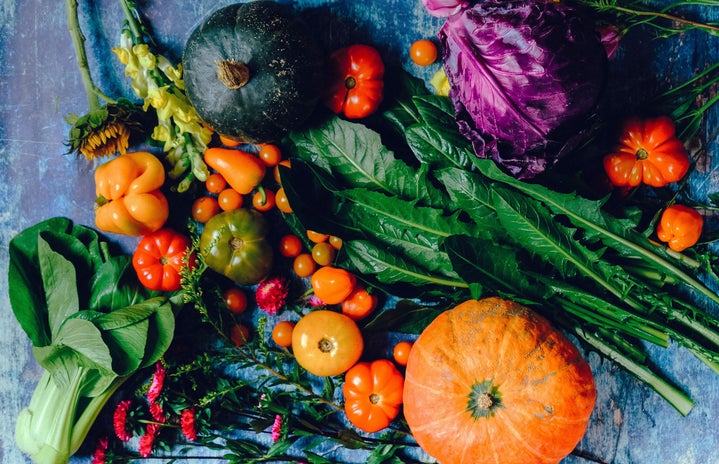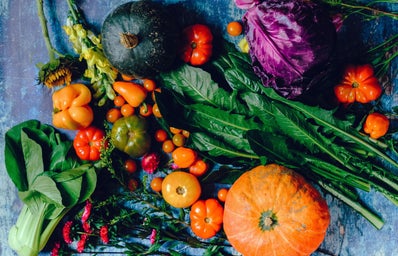Larry hands Lucinda a fresh stalk, picked right from the stem. “You gotta taste this corn,” he says. She cherishes this core memory, husking the corn right off the stem and eating it raw. The corn was bursting with flavor, she recalls. “Oh my God, there’s nothing like it.”
“From farm to table,” a phrase that is often said, but the meaning behind it is rarely fully appreciated. Farmers are hard at work, saving our planet with each dig and harvest. The livelihood of planet Earth lies partly in their hands. The future of food sustainability begins with local farming. It begins with the people at the forefront of it all.
Organic local farming helps both the earth and surrounding communities. Lucinda Poindexter and fellow farmers, such as Larry, are committed to both. Being the executive director at the nonprofit organization, Chester Agricultural Center, she has taken her background in community building to benefit her own community in the Hudson Valley. This nonprofit handles over 270 acres of fertile black dirt. They distribute the produce to nearby towns as well as New York City. Farming is taken for granted in our society and Lucinda strives to change that narrative. From being out in the fields to chatting with customers about produce, Lucinda is constantly learning more about herself and the people around her. She is also learning more about sustainability every time she goes into work. In sharing her eco-friendly knowledge with the community, she is helping to save planet Earth. Without the work of Lucinda and farmers across the world, our planet would be doomed. She cares deeply for her community. This passion she has speaks for itself through her work. As she talks about her time spent at Chester Agricultural Center, her eyes light up and a smile spreads across her face.
Lucinda put her background in community building to use when she moved to Cornwall, New York. She knew exactly what she wanted to do.
Her business venture of 2Alices, “was all about building community and having local artists come. It gets to be a hangout,” she says.
2Alices is a coffee shop in the town of Cornwall. It is known for being a place where people can relax and engage with not just one another, but also the locally produced food, drinks, and art. This up-and-coming business evolved into her discovering her true passion for supporting local businesses. She eventually found herself working for the Cornwall Community Food Co-Op and then an organization that uplifts local businesses, Rethink Local.
“So that’s how I got into it, I don’t really have a background in farming at all,” she recalls, laughing at the irony of it. With a minimal background in farming, there was a bit of a learning curve for Lucinda. This was all a part of the experience for her.
Owning over two hundred acres of black dirt, there is plenty to go around. Black dirt is only found in a select number of places around the world.
“It’s such a treasure for Chester,” she says, feeling grateful to be able to work with it.
Lucinda’s main focus on the farm is to take care of the soil and land for the benefit of the earth and her community. This precious land is leased to local farmers.
“We are a nonprofit, so our mission is to really help a diverse group of people get onto the land,” Lucinda explains. She emphasizes her love for promoting diversity by having BIPOC- and LGBTQ+-owned farms where she works.
Lucinda’s work is a direct result of her dedication and love for what she does.
“Yeah, that feels really good,” she says when asked about her work’s influence on the areas around her. Her work has changed the way she views the value of food, and her goal is to change others’ views throughout the community.
“I think slowly we’re getting people to change their view and see the value of this organically grown produce,” she says with hope.
The work of Lucinda became an outlet to spread her learned experiences-and the importance of them-to the community. Her work in and of itself has enriched her own human experience.
“You realize how valuable food is and that it’s so central to everybody’s lives,” she explains with conviction.
She talks about how most people do not realize, until they have been on a farm, the amount of work that goes into growing a single carrot. This realization has made her more aware of the common culture of not valuing what goes into what we eat, and she hopes to switch that narrative. Lucinda speaks of these reflections with such sincerity and importance.
“It still is building community,” circling back to her foremost passion. It is not about the money for her. It is about connecting people.
Making recipes with this fresh produce and bringing them to potlucks is a common occurrence for Lucinda. She loves to say, “So-and-so got this today from their field” when bringing these dishes to friends and family to show where this food comes from. Sharing these fruits and vegetables with her loved ones brings them together while deepening their connection to the local community.
She also dreams of making fresh produce more accessible to the Hudson Valley. There was a disconnect between the community members and farmers at the start of the nonprofit. She
wishes to fill this gap through members and farmers working together to support one another via food.
Lucida talks about how there are certain seasons where crops thrive the most. “And that’s what’s sad because a lot of people think,” she says, ‘Oh well I can buy tomatoes any time.’ Well you really can’t.”
There are just these six weeks in the summer where tomatoes taste particularly delicious and juicy. These specific time frames are what makes local farming so special. Lucinda hopes to make this specialty well known.
“I just live for that,” she exclaims while describing the warm-season harvest.
At Chester Agricultural Center, farmers harvest on the same day they market their produce. Lucinda emphasizes the beauty of buying and eating produce the exact day it was picked. She recounts the many times she has done this. She imitates an explosion sound when she describes how the fresh food is so delicious and flavorful.
Lucinda thinks back to her memories when the farm’s produce brought people together. She takes pride in being able to tell others about where the food comes from.
“Seeing the little seedlings that go in at the greenhouses and then six weeks later they’re harvesting them,” Lucinda says, is such a stunning experience for her to see. “It’s just the life of these plants that sustain us, it’s just so amazing,” she says. This experience is something in which we all share as humans.
Lucinda loves sharing this eye-opening process of farming with others. “I always want to bring my friends out there to show them,” she says.
She reflects on seeing the farmers planting at the greenhouses, attentively covering the seedlings with this rich, dark, fertile soil. If people were to see these farmers firsthand, putting
all their love and care into these plants, their perspective on local farming would change for the better.
Lucinda recalls one of her favorite experiences working at Chester Agricultural Center. Next to the market is another booming local business: Meadow Blues. Last fall all the farmers had a friendsgiving in the back patio of this coffee shop, looking over the breathtaking view of the farm fields as the sun sets. It was really cold that day, Lucinda recalls, but they had a warm, crackling fire to keep them snug.
“Everybody brought something that was from their farm,” she says, looking nostalgic as she remembers this special moment. “All the farmers were there, so there’s Black and White and Latinx and LGBTQ, and it was just great. I guess that’s one of my soft spots, is when all of these people come together.”
Lucinda says how it is beautiful to see everyone connect and learn more from one another. Gathered around the lively fire, the farmers can simply talk about the farmer’s life. This is something they all experience day-to-day. Being able to rant or laugh about common experiences farmers go through brings them closer in that way.
During the height of the season, the farmers do not get many opportunities to share their fresh produce with each other. “To see them kinda relax and enjoy each other’s company, that’s great,” she says with immense joy.
Being able to taste their own and each other’s freshly-picked harvests is an experience unlike any other. They are the ones putting in all the work and it pays off with this very moment. Getting people together, getting the community to connect-this is what it’s about for Lucinda. She cannot stress enough how vital small farms are to local places, for so many reasons.
Lucinda talks about large industrial farms and how, “it’s just so scary what it’s doing to our environment.” She learns more and more every year about how to be more sustainable in the world we’re living in now.
She holds a lot of appreciation for her work and how it changes her views on the world each day. Lucinda stresses the importance of supporting these locally-owned small farms and to appreciate the work of the people running them. She feels as if their work often goes unnoticed. Waking up at the crack of dawn to harvest is not an easy job but farmers do so for the betterment of their community.
At the end of the day, it’s about the people. The market is set up with two long foldable tables, a colorful woven rug draping over it. The small, ragged pieces of cardboard are written on with black Sharpie, labeling the fresh produce. The gray safe is placed at the end of the table, ready for the day’s profits. Locals approach the stand, marveling at the rich color of these organic foods. Customers make small talk by excitedly explaining the recipes they are planning to make with their newly-purchased goods. They ask the vendors about a particular harvest, usually looking astonished when they hear it was picked just that morning.
They leave with their brimming biodegradable green bags, excited to tell their friends and family where their food is coming from.


